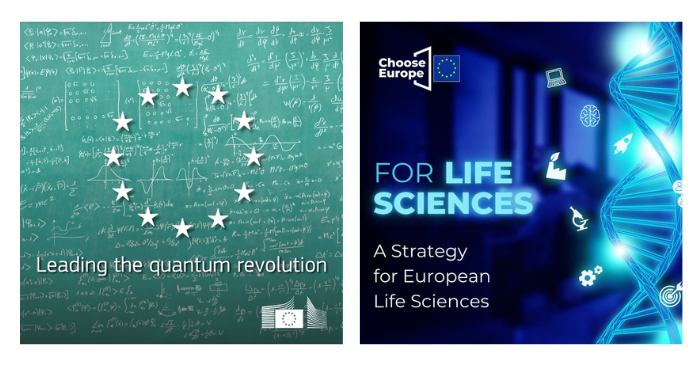
Two new EU strategies: Europe Invests in Quantum Research and Life Sciences of the Future

Quantum strategy: Europe's leap into the next technological dimension
The ‘Quantum Europe’ Strategy shall establish a robust European quantum ecosystem, focusing on research, infrastructure, industrial applications, and training. Measures include:
- Launching the Quantum Europe Research and Innovation Initiative, a joint EU and Member States' effort to support foundational research and develop applications in key public and industrial sectors.
- Establishing a quantum design facility and six quantum chips pilot lines, backed by up to €50 million in public funding, to transform scientific prototypes into manufacturable products.
- Launching a pilot facility for the European Quantum Internet.
- Expanding the network of Quantum Competence Clusters across the EU and establishing the European Quantum Skills Academy in 2026.
- Developing a Quantum Technology Roadmap in Space with the European Space Agency and contributing to the European Armament Technological Roadmap.
It is expected that the market will reach a global value of around 155 billion euros by 2040. Further information can be found here.
Life sciences: bringing innovations to patients faster
The new EU strategy for life sciences sees the Commission taking a holistic approach along the entire innovation chain, from laboratory to application. Key objectives:
- Promoting microbiome-based therapies (€100 million from Horizon Europe 2026–27).
- €250 million for new life science technologies (e.g. molecules, materials, production processes).
- Accelerating market access with the EU Biotech Law
- A networking platform for start-ups, industry and investors
- Set-up of a Life Sciences Coordination Group to facilitate cross-sector coordination
- €300 million for public procurement in areas such as vaccines, cancer research and climate adaptation
The EU's life sciences sector contributes 1.5 trillion euros to the economy and secures 29 million jobs. Further information can be found here.
Relevance for Bavaria: funding opportunities and a strong starting position
Both strategies lay the groundwork for a wide range of funding opportunities for Bavarian universities, research institutions, and companies, particularly within the framework of Horizon Europe, the European Innovation Council (EIC), and major strategic projects, such as IPCEIs. Bavaria is already in an excellent position in both areas.
- In the field of quantum technologies, for example, Bavaria is one of Europe's leading quantum regions, home to the Munich Quantum Valley, several Fraunhofer Institutes and the MCQST Cluster of Excellence.
- In the life sciences, the Free State also has strong Bavarian centres of bioscientific excellence, where universities, clinics, non-university research institutes and companies cooperate closely. These centres are located in Martinsried, Würzburg, Regensburg and Erlangen-Nuremberg.
BayFOR supports Bavarian stakeholder in positioning themselves strategically, forming strong consortia and submitting promising project proposals.




